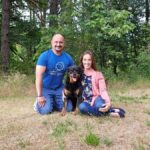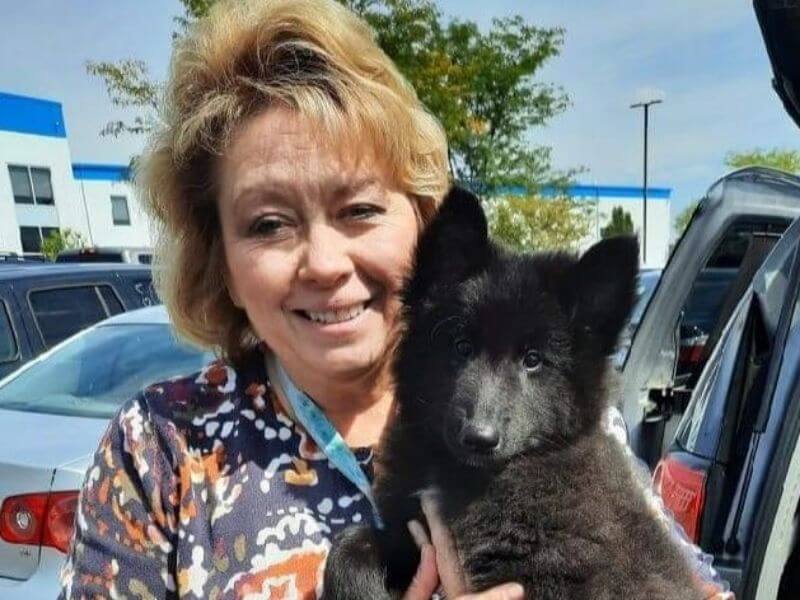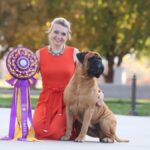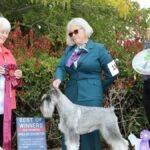Interview with Sherri Swabb, Breeder of Sarron Belgian Sheepdogs
Please tell us a little bit about yourself. Where do you live? What is your breed? What is your kennel name? Do you have a website? How long have you been in dogs? How long have you been breeding dogs? Who are some of your best-known dogs?
Sherri Swabb: My name is Sherri Swabb and I live in Sugarcreek Twp., Ohio. I breed Belgian Sheepdogs under the Sarron kennel name and my website is www.sarronbelgians.com. I have been showing/training purebred dogs since 1985 and breeding Belgian Sheepdogs since 1997. I have whelped 16 litters and have produced more than 50 dogs with titles – qualifying me for Breeder of Merit Gold status. My female, “Tori,” BISS GCHB Sarron Notorious BN RN FCAT TKN CGC, won the Belgian Sheepdog Club of America National Specialty this year (2023) under breed specialist Linda Robey!
As a Breeder, can you share your thoughts on your breed today? Is breed type strong? Are there things to be concerned about? Are there any health-related issues? Have you worked with breeders overseas? Are pet homes typically available for your breed?
Sherri Swabb: Belgian Sheepdogs today are good overall. While we always have room for improvement, I think that breeders have improved on front assemblies and temperament. I do think that in the US we have more varied breed type than in Europe, because we do import more dogs and semen from Europe into our breeding programs than they do in return. This can make for a diverse-looking line-up of dogs in the show ring. My biggest concern for Belgian Sheepdogs is the growing influx of black, coated Malinois that are being produced for working and sport dogs but are registered as Belgian Sheepdogs in the US.
This can present a challenge, as most show line Belgian Sheepdogs do not have the tenacious drive that the working Malinois do, and sometimes unsuspecting owners can wind up with “too much dog” while thinking they have just purchased a great companion. Our health-related issues are still the same; epilepsy and gastric carcinoma. These two issues cause the most heartache in our breed. We do not have DNA markers for these issues, so we are unable to eliminate these problems in the breed. Additionally, there is a lack of transparency when it comes to health-related issues with many breeders. There are many people in the US who adore Belgian Sheepdogs, so companion, performance, and show home placements are typically not an issue for the black, long-haired Belgians. I always have a waiting list for companions.
As an Exhibitor, can you comment on recent entries in your breed? Are majors available in your area? Does your breed often participate in Companion and Performance events? How can newcomers in your breed be encouraged to join the sport of dogs?
Sherri Swabb: In my geographical region, we typically work together to build majors in our breed. Belgian Sheepdogs are a Low Entry Breed by AKC records, but as a group of fanciers we do work together to build points at many shows. The breed overall is SO versatile that most show homes also participate in companion and performance events as well. Belgians just LOVE to be with their people and are always game to try new sports. They are a biddable breed by nature and love to work, so their temperament usually lends itself to the new owners feeling comfortable with trying out a sport or two! The people in the breed are supportive of each other as well.
What are the biggest challenges facing the dog show community as a whole and how can we address them? And finally, what are some of the positive changes you’ve seen in your breed and in the dog show community as a whole over the past decade?
Sherri Swabb: I feel the biggest challenge facing the dog show community is economics and costs. Dog shows are a luxury, and as people prioritize how their money is spent, they are maybe a bit more targeted with their spending on dog-related events than they would have been 10-15 years ago. Now, having said that, I think that the variety of new companion and performance events offered is GREAT! It really allows for newcomers in our breed and sport to try out a lot of different events in order to find the one they most enjoy with their dog! Scent Work allows for great team building while not requiring a tremendous physical exertion on dog or handler.
Barn Hunt is similar; lots of fun for the dog without precise training. Fast CAT allow dogs to just RUN, which all dogs LOVE! These new events offer more opportunities to enjoy the human/dog bond every day.








